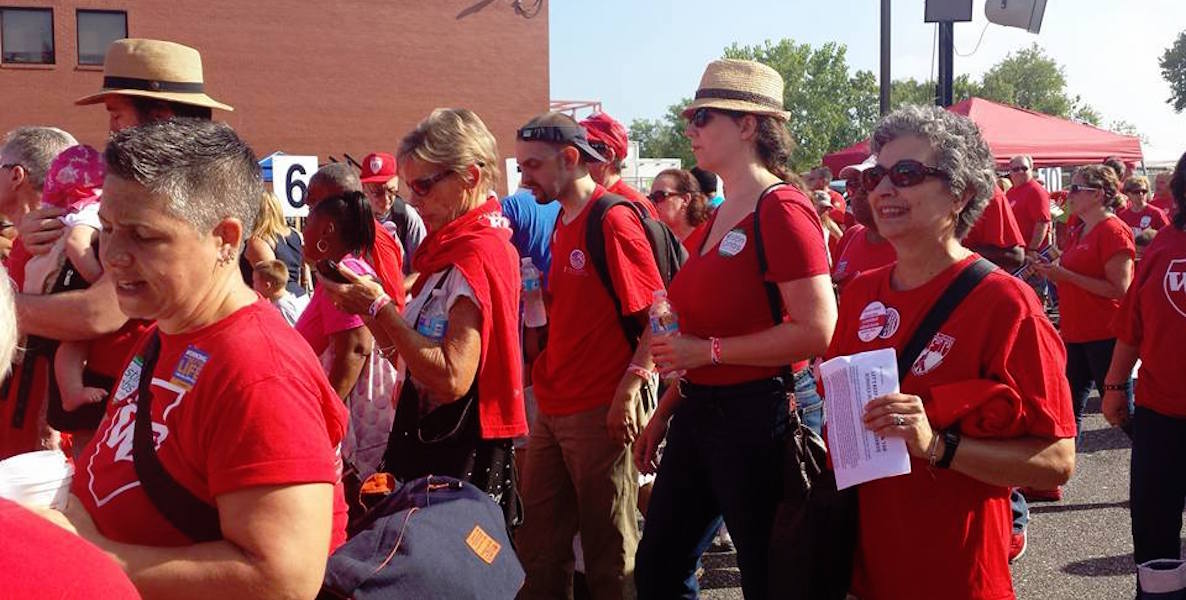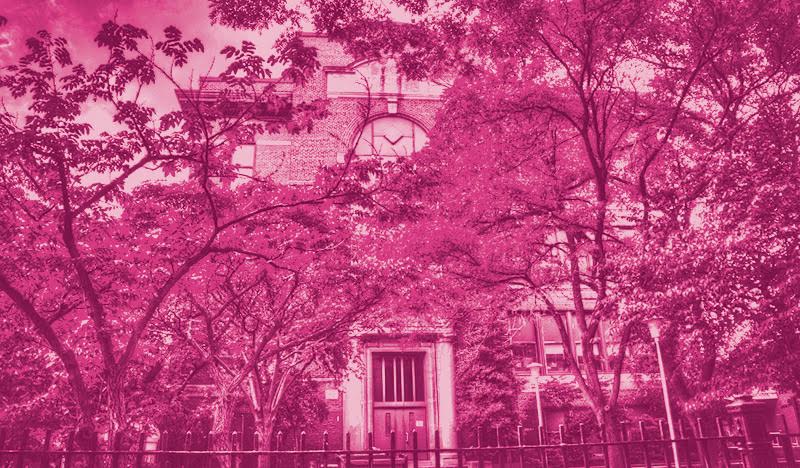It’s summer. School’s out. Teachers citywide are, or could be, taking a much-needed break from academics, and school politics, and learning—perhaps paging through a stack of easy beach reads that transport them far from the intensity of their regular lives. But for a couple hundred teachers and their supporters, summer reading—and the experience that goes with it—is anything but escapist fare. It is a pertinent, in some cases life-changing, education all on its own.
For the third year in a row, two activist teacher groups—Caucus of Working Educators (WE) and Teacher Action Group (TAG)—have paired up for a summer reading series intended to explore various social and political issues that affect education in Philadelphia. This year, 240 participants have signed up to read one or more of 15 different books about race, immigration, poverty, gender and teaching. Each book group, led by a teacher/facilitator, will meet up to four times over the summer to discuss the readings, and what they mean to them, as educators. In early September, all participants will gather together to share what they’ve learned—and to decide on how they’ll implement those lessons over the next school year. (Anyone, even non-teachers, can participate, and can still sign up.)
The citywide book club has a lofty set of goals: Creating better teachers, stronger relationships with the community, and—eventually—a better school system for all. It’s reading as a means to social action, using the tools that teachers know best—education—to fuel a shift in the world they care about most: Education. “There’s a power that comes from people reading together,” says Kathleen Riley, a West Chester University education professor, who is a supporting member of WE. “Sharing impressions of a book can make you vulnerable, let you see the world from another perspective. For teachers, reading together in the summer when there’s less pressure and need for direct action in the classroom, they form strong relationships to each other, and to the subjects.”
The first year, the books bolstered WE’s assertion about what they call the “dismantling” of public schools—specifically the rise of charters. That is—intentionally—not the language of compromise. But is it the language of solutions? It’s impossible to know, so early in the game, even what those solutions look like.
It was actually a book club that spawned the formation of the Caucus of Working Educators, in the spring of 2014. On the heels of drastic budget cuts and layoffs in the School District, several frustrated teachers from TAG got together to read and discuss Lois Weiner’s Future of Our Schools, a sort of manifesto calling on teachers, through their unions, to become social justice warriors. Kelley Collings, WE co-chair, says Weiner’s message resonated, and several teachers formed WE that March as a mini-union within the Philadelphia Federation of Teachers. (WE takes dues from members, and is broadly focused; 11-year-old TAG, part of a national teacher activist group, does not take dues, and primarily focuses on four big events a year.)
“We believe our union should be addressing racial justice and other issues that affect not only our schools, but our communities,” Collings says.
Now 300-strong, WE was inspired by Chicago’s Caucus of Rank and File Educators (CORE), a grassroots uprising that took over that city’s teachers union several years ago. The results of that takeover have not been decidedly better schools, better working conditions for teachers, or better politics—Chicago’s schools suffer the same sorts of ills as Philadelphia’s, their teachers also do not have a contract, and their union head recently called Illinois Gov. Bruce Rauner an “ISIS recruit.” But it signaled a shift among some teachers’ unions—including CORE and WE—towards “social justice unionism,” a form of organizing based on the idea that unions must be about more than workplace issues; they must be about changing schools and society to benefit teachers, students, parents and communities. The idea hearkens back to the earliest days of education organizing, when the fight for a professional teachers union was linked to women’s suffrage: Most teachers were women, so inevitably teachers rights became women’s rights, a social movement beyond the school walls.
In Philadelphia today, the issues that embolden WE members are around racial justice, in particular creating school policies, programs and curricula to better address the needs of the District’s predominantly African American students and their families; limiting the expansion of charter schools; and building a union with more active and involved members. “We’re fighting the systematic starvation of our public school system over the last 25 years,” says Collings. “But we can have a much broader effect than just education. We want to bring parents and teachers together to make changes—like the Fight for 15, healthcare, racial justice.”
This new form of unionism is perhaps the inevitable result of the times we live in. After 25 years of the same teacher union leadership, at what may be the worst moment in urban education, many have a sense at least in Philadelphia that things couldn’t get worse—and that a new, more radical approach is needed. That is the same sort of sentiment that informs the rancorous education reform debate—and politics more generally—nationwide. WE is about teaching only in as much as teaching is political, something Collings acknowledges when she notes that, “Teaching in cities like Philadelphia is a political act.”
WE/TAG’s first summer reading series, just a few months after the Caucus formed in 2014, was a call to arms. The nine books selected were specifically related to WE’s mission: Diane Ravitch’s takedowns of the charter school movement, books celebrating the Chicago social action union, others that provided blueprints for union organizing. Among the books were none that offered a differing viewpoint on charters, or on other forms of unions, or on a middle path; they bolstered WE’s assertion about what they call the “dismantling” of public schools—specifically the rise of charters. That is—intentionally—not the language of compromise. But is it the language of solutions? It’s impossible to know, so early in the game, even what those solutions look like.
WE is about teaching only in as much as teaching is political, something Collings acknowledges when she notes that, “Teaching in cities like Philadelphia is a political act.”
There’s no question, though, that the movement is growing. Last year, 170 people participated in 12 book groups focusing on racial justice, including Michelle Alexander’s The New Jim Crow: Mass Incarceration in the Age of Colorblindness; A Movement Without Marches: African American Women and the Politics of Poverty in Postwar Philadelphia, by Lisa Levenstein; and Teaching to Transgress, by Bell Hooks. Collings—who read all of the first year’s books, and 10 from the second year—says The New Jim Crow, especially, was eye-opening for a 47-year-old white woman who grew up in a small town in Maryland. “It was an incredibly powerful experience to rethink the history of the United States through the theme of racial justice,” she says. “It changed me. It affects who I am, so it affects how I teach.”
It remains to be seen what lasting impact WE, or TAG, will have on Philly schools—or more importantly, on Philly school students. The Caucus ran its first slate of leaders in the winter, hoping to unseat Jerry Jordan and the longtime PFT leadership. They lost the election, but say there have been some concessions—the PFT’s making a primary election endorsement, better communication with the rank-and-file—that reflect a similar push in the national teachers union, because of social justice caucuses throughout the country. “When we built ourselves as a Caucus, it was to transform the union from the bottom up,” says Collings. “The point of a caucus is to build ourselves around common values, and try to move the union. We continue to do that.”
Meanwhile, no one, not even Collings, is suggesting that book clubs are the answer to what ails our education system. But maybe they are a start. As Malala Yousafzai, whose struggles for the sake of education put many things in perspective, has said, “Let us remember: One book, one pen, one child, and one teacher can change the world.”
Photo header: Facebook/Caucus of Working Educators



